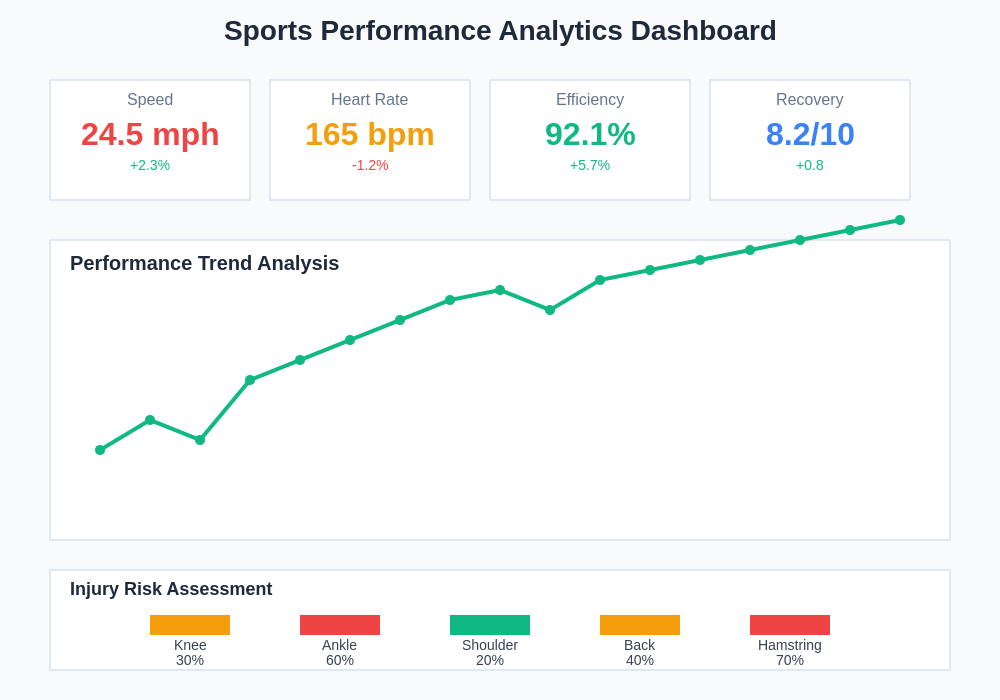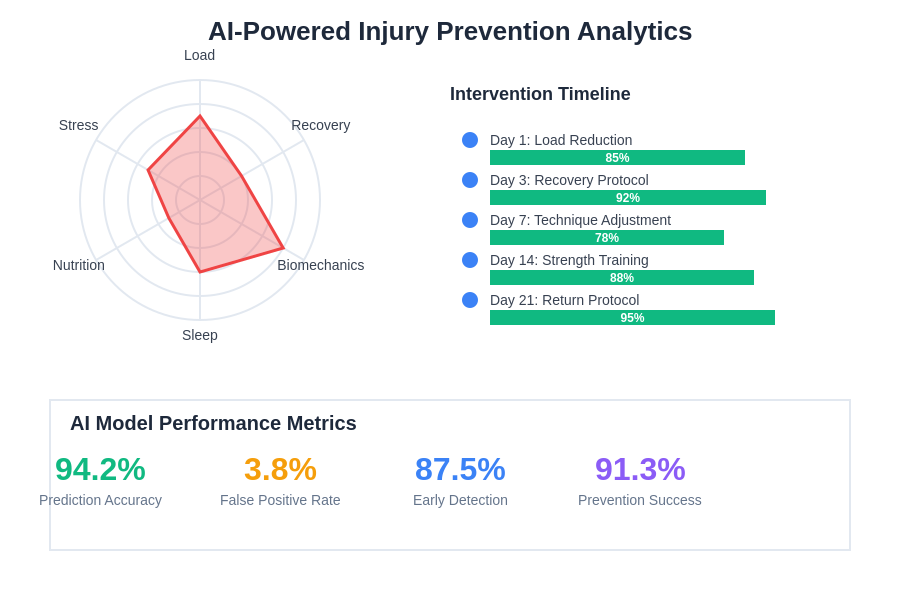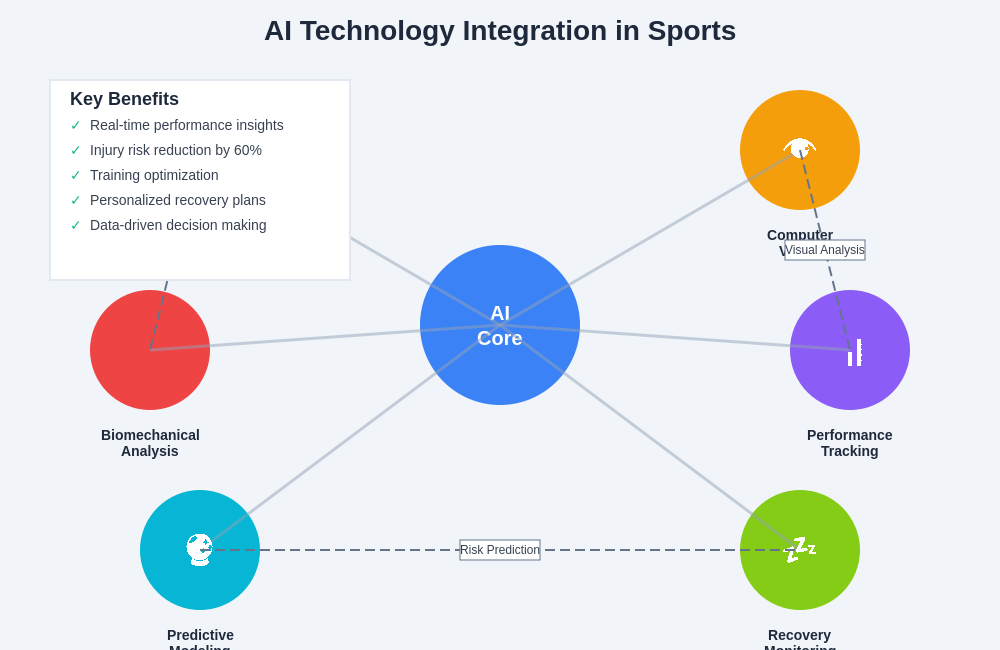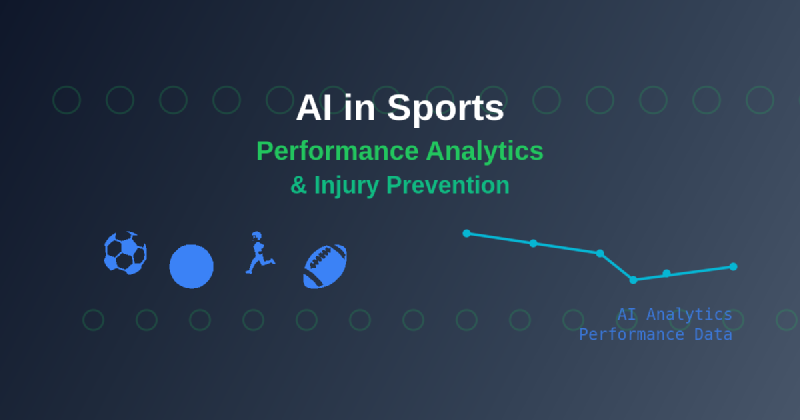The intersection of artificial intelligence and sports has created a revolutionary paradigm that is fundamentally transforming how athletes train, compete, and recover. Through sophisticated data analysis, predictive modeling, and real-time performance monitoring, AI has emerged as an indispensable tool that enhances athletic performance while simultaneously reducing the risk of injury. This technological evolution represents a profound shift from traditional intuition-based coaching methods to evidence-driven strategies that optimize every aspect of athletic development and competition preparation.
Explore the latest AI innovations in sports technology to stay informed about cutting-edge developments that are reshaping competitive athletics and recreational sports alike. The integration of artificial intelligence into sports science has opened unprecedented opportunities for understanding human performance limitations and unlocking athletic potential through data-driven insights that were previously impossible to obtain or analyze effectively.
The Evolution of Sports Analytics Through AI
The transformation of sports analytics through artificial intelligence represents one of the most significant technological advances in modern athletics. Traditional sports analysis relied heavily on basic statistical measurements and subjective observations from coaches and trainers, often missing crucial patterns and correlations that could significantly impact performance outcomes. The advent of AI-powered analytics has revolutionized this landscape by introducing sophisticated algorithms capable of processing vast amounts of performance data, identifying subtle patterns, and generating actionable insights that enhance decision-making processes across all levels of athletic competition.
Modern AI systems can simultaneously analyze multiple data streams including biomechanical measurements, physiological indicators, environmental conditions, and historical performance records to create comprehensive athlete profiles that inform training strategies and competition tactics. This multidimensional approach to sports analytics has enabled coaches and sports scientists to develop highly personalized training programs that address individual strengths and weaknesses while optimizing performance potential through evidence-based methodologies.
Advanced Performance Monitoring and Optimization
The implementation of AI-driven performance monitoring systems has fundamentally altered how athletic performance is measured, analyzed, and improved. These sophisticated systems utilize advanced sensors, computer vision technology, and machine learning algorithms to capture and process real-time performance data during training sessions and competitive events. The granular level of analysis achievable through AI technology enables the identification of minute technical adjustments that can yield significant performance improvements while maintaining optimal biomechanical efficiency.
Performance optimization through AI involves continuous data collection and analysis that extends far beyond traditional metrics such as speed, strength, and endurance measurements. Modern systems can evaluate factors including movement efficiency, energy expenditure patterns, recovery rates, psychological stress indicators, and tactical decision-making effectiveness to provide comprehensive performance assessments that guide training modifications and competition strategies.
Enhance your understanding of AI applications with Claude for detailed analysis and insights into how artificial intelligence is revolutionizing sports performance and athlete development across diverse athletic disciplines. The sophisticated analytical capabilities of AI systems enable unprecedented understanding of performance variables that influence athletic success.
Biomechanical Analysis and Technique Refinement
Artificial intelligence has revolutionized biomechanical analysis by providing unprecedented precision in movement assessment and technique optimization. Advanced computer vision systems equipped with machine learning algorithms can analyze athletic movements with microscopic detail, identifying inefficiencies and suggesting corrections that human observers might miss. This technology enables coaches and athletes to understand the complex relationships between body positioning, force application, timing, and performance outcomes across various sporting disciplines.
The application of AI in biomechanical analysis extends beyond simple motion capture to include predictive modeling that can forecast the impact of technique modifications on performance and injury risk. These systems can simulate thousands of movement variations to identify optimal techniques for individual athletes based on their unique physical characteristics, training history, and performance objectives. This personalized approach to technique development represents a significant advancement over traditional one-size-fits-all coaching methodologies.
Predictive Injury Prevention Systems
One of the most transformative applications of AI in sports involves the development of sophisticated injury prevention systems that can predict and prevent athletic injuries before they occur. These systems analyze comprehensive datasets including training loads, biomechanical patterns, physiological markers, sleep quality, nutrition data, and environmental factors to identify risk patterns that precede injury events. By recognizing these early warning signs, AI systems can recommend specific interventions to mitigate injury risk and maintain athlete availability throughout competitive seasons.
The predictive accuracy of modern AI injury prevention systems continues to improve as machine learning algorithms process larger datasets and identify increasingly subtle risk indicators. These systems can distinguish between normal training adaptations and potentially dangerous overload patterns, enabling precise adjustments to training intensity, recovery protocols, and competition schedules that minimize injury risk while maintaining peak performance capabilities.

The comprehensive visualization of athlete performance data through AI-powered dashboards provides coaches and sports scientists with intuitive access to complex analytical insights. These systems integrate multiple data sources to present actionable information that supports evidence-based decision-making in training and competition environments.
Training Load Optimization and Recovery Management
Artificial intelligence has transformed training load management by providing sophisticated algorithms that can optimize the balance between training stimulus and recovery requirements for individual athletes. These systems continuously monitor physiological indicators, performance metrics, and subjective wellness measures to determine optimal training intensities and volumes that maximize adaptation while minimizing overtraining risk. The precision achievable through AI-driven load management enables athletes to train closer to their physiological limits while maintaining consistent performance improvements.
Recovery management through AI involves comprehensive analysis of sleep patterns, heart rate variability, biochemical markers, and performance trends to determine optimal recovery strategies for individual athletes. These systems can recommend specific recovery interventions including sleep optimization, nutrition adjustments, active recovery protocols, and therapeutic interventions that accelerate the recovery process and prepare athletes for subsequent training sessions or competitions.
Real-Time Competition Analysis and Strategy Adjustment
The implementation of AI systems for real-time competition analysis has created new possibilities for tactical adjustments and strategic decision-making during athletic events. These systems can process live competition data to identify patterns, predict opponent behaviors, and recommend tactical modifications that can influence competition outcomes. The speed and accuracy of AI analysis enable coaches to make informed decisions based on comprehensive data rather than relying solely on intuition or limited observational capabilities.
Real-time AI analysis extends beyond simple statistical tracking to include sophisticated pattern recognition that can identify emerging trends and opportunities during competition. These systems can evaluate factors such as fatigue levels, performance decline patterns, tactical effectiveness, and environmental impacts to provide strategic recommendations that optimize competitive performance throughout the duration of athletic events.
Access comprehensive research capabilities with Perplexity for in-depth exploration of sports science research and emerging technologies that support AI-driven athletic performance optimization. The rapid advancement of AI applications in sports requires continuous learning and adaptation to leverage new technological capabilities effectively.
Talent Identification and Development
Artificial intelligence has revolutionized talent identification processes by providing objective, data-driven methods for evaluating athletic potential and predicting future performance capabilities. Traditional talent identification often relied on subjective assessments and limited performance indicators that could miss athletes with unconventional development patterns or delayed maturation timelines. AI systems can analyze comprehensive datasets including physiological measurements, biomechanical assessments, cognitive evaluations, and performance trajectories to identify athletes with exceptional potential for development in specific sports or positions.
The application of AI in talent development extends beyond identification to include personalized development pathways that optimize individual potential through tailored training programs, skill development strategies, and competition exposure plans. These systems can predict optimal training progressions, identify critical development windows, and recommend interventions that maximize athletic potential while minimizing developmental setbacks or career-limiting injuries.
Nutrition and Lifestyle Optimization
The integration of AI into nutrition and lifestyle management has created sophisticated systems that can optimize dietary strategies, hydration protocols, and lifestyle factors to support peak athletic performance and recovery. These systems analyze individual metabolic profiles, training demands, competition schedules, and physiological responses to develop personalized nutrition plans that optimize energy availability, recovery rates, and adaptation to training stimuli.
AI-driven lifestyle optimization encompasses comprehensive analysis of factors including sleep quality, stress management, social influences, and environmental conditions that impact athletic performance and well-being. These systems can identify lifestyle modifications that enhance performance outcomes while supporting long-term athlete health and career longevity through evidence-based recommendations tailored to individual circumstances and preferences.
Mental Performance and Psychological Analysis
The application of artificial intelligence to mental performance analysis represents an emerging frontier in sports psychology that promises to unlock new levels of athletic achievement through optimized psychological preparation and mental skills development. AI systems can analyze patterns in performance data, physiological indicators, and behavioral markers to identify psychological factors that influence competitive performance and recommend interventions that enhance mental resilience, focus, and competitive confidence.
Psychological analysis through AI involves sophisticated pattern recognition that can identify relationships between mental states, performance outcomes, and environmental factors that traditional assessment methods might overlook. These systems can develop personalized mental training programs that address individual psychological needs while building mental skills that translate directly to improved competitive performance and enhanced ability to perform under pressure.

The sophisticated analysis of injury risk factors through AI systems enables proactive intervention strategies that significantly reduce injury incidence while maintaining optimal training intensities. These predictive models integrate multiple data sources to identify subtle risk patterns that precede injury events.
Team Dynamics and Collective Performance Analysis
Artificial intelligence has expanded beyond individual athlete analysis to encompass team dynamics and collective performance evaluation in team sports. These systems can analyze complex interactions between team members, identify optimal lineup combinations, and evaluate tactical effectiveness through comprehensive data analysis that considers both individual contributions and collective performance outcomes. The insights generated through team-focused AI analysis enable coaches to optimize team chemistry, strategic approaches, and player utilization patterns that maximize competitive success.
Team performance analysis through AI involves sophisticated modeling of player interactions, communication patterns, spatial relationships, and collective decision-making processes that influence team effectiveness. These systems can identify optimal team configurations for different competitive scenarios while predicting the impact of personnel changes on overall team performance and competitive outcomes.
Equipment and Technology Integration
The convergence of AI with sports equipment and wearable technology has created unprecedented opportunities for performance enhancement and injury prevention through intelligent equipment design and real-time feedback systems. Smart equipment integrated with AI capabilities can provide immediate feedback on technique, performance metrics, and safety parameters that enable continuous improvement and risk mitigation during training and competition activities.
Technology integration extends beyond simple data collection to include adaptive systems that can modify equipment characteristics in real-time based on performance requirements and environmental conditions. These intelligent systems represent the future of sports technology where equipment becomes an active participant in performance optimization rather than a passive tool used by athletes and coaches.

The seamless integration of artificial intelligence with sports technology creates comprehensive performance ecosystems that support every aspect of athletic development from training optimization to competition strategy and injury prevention.
Data Privacy and Ethical Considerations
The extensive data collection and analysis capabilities of AI systems in sports raise important considerations regarding athlete privacy, data security, and ethical use of personal performance information. Sports organizations must develop comprehensive policies and procedures that protect athlete privacy while enabling the beneficial applications of AI technology for performance enhancement and injury prevention. These considerations become particularly complex when dealing with youth athletes, professional contracts, and competitive advantages derived from proprietary AI systems.
Ethical considerations in sports AI also encompass questions of fairness, accessibility, and competitive equity when advanced AI systems provide significant advantages to athletes and organizations with greater technological resources. The sports community must address these challenges to ensure that AI technology enhances rather than undermines the fundamental principles of fair competition and athletic achievement.
Future Developments and Technological Advancement
The rapid advancement of AI technology promises continued evolution in sports applications with emerging capabilities including more sophisticated predictive modeling, enhanced real-time analysis, improved injury prevention systems, and deeper integration with physiological monitoring systems. Future developments may include AI systems capable of conducting autonomous coaching sessions, predictive performance modeling across entire athletic careers, and integration with genetic analysis for optimized training and development strategies.
The convergence of AI with other emerging technologies such as virtual reality, augmented reality, and advanced biotechnology will create new possibilities for athletic training and performance enhancement that are currently beyond imagination. These technological advancements will continue to push the boundaries of human athletic achievement while providing new tools for understanding and optimizing the complex relationships between training, performance, and human potential.
The transformation of sports through artificial intelligence represents a fundamental shift toward evidence-based athletic development that optimizes human performance while protecting athlete health and longevity. As AI technology continues to advance, its applications in sports will undoubtedly expand to encompass new dimensions of athletic performance and create opportunities for achievements that represent the pinnacle of human-AI collaboration in competitive athletics.
Disclaimer
This article is for informational purposes only and does not constitute professional medical, training, or sports science advice. The views expressed are based on current understanding of AI applications in sports and athletic performance. Readers should consult with qualified sports professionals, medical practitioners, and certified trainers before implementing any AI-driven training or performance optimization strategies. The effectiveness of AI systems may vary depending on individual circumstances, sport-specific requirements, and implementation quality.
